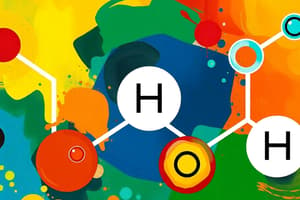Podcast
Questions and Answers
What is organic chemistry primarily concerned with?
What is organic chemistry primarily concerned with?
The study of carbon-containing compounds and their properties.
Name a functional group commonly found in alcohols.
Name a functional group commonly found in alcohols.
-OH
What is the difference between structural isomers and stereoisomers?
What is the difference between structural isomers and stereoisomers?
Structural isomers have the same molecular formula but different structures, while stereoisomers have the same structure but differ in the spatial arrangement of atoms.
Describe the addition reaction in organic chemistry.
Describe the addition reaction in organic chemistry.
What process involves linking monomers to form polymers?
What process involves linking monomers to form polymers?
What does inorganic chemistry primarily study?
What does inorganic chemistry primarily study?
How does physical chemistry differ from analytical chemistry?
How does physical chemistry differ from analytical chemistry?
What focus area does biochemistry explore?
What focus area does biochemistry explore?
Define environmental chemistry.
Define environmental chemistry.
Flashcards are hidden until you start studying
Study Notes
Organic Chemistry
- Definition: Study of carbon-containing compounds and their properties.
- Functional Groups: Specific groups of atoms that determine the characteristics and reactions of organic molecules.
- Examples: Alcohols (-OH), Carboxylic acids (-COOH), Amines (-NH2).
- Isomerism: Compounds with the same molecular formula but different structures/properties.
- Types: Structural isomers, Stereoisomers (geometric and optical).
- Reactions:
- Addition: Atoms add to a double or triple bond.
- Substitution: An atom or group is replaced by another atom/group.
- Elimination: Removal of atoms/groups to form a double bond.
- Polymerization: Process of linking monomers to form polymers (e.g., plastics).
Branches of Chemistry
- Organic Chemistry: Focuses on carbon-containing compounds.
- Inorganic Chemistry: Studies inorganic compounds, often excluding hydrocarbons.
- Physical Chemistry: Examines the physical properties and behavior of chemical systems, including thermodynamics and kinetics.
- Analytical Chemistry: Techniques and methods for analyzing substances to determine their composition and structure.
- Biochemistry: Explores chemical processes within and related to living organisms.
- Theoretical Chemistry: Uses mathematical models and abstractions to explain chemical behavior and predict outcomes.
- Environmental Chemistry: Studies chemical processes occurring in the environment and their effects on ecosystems and human health.
Organic Chemistry
- Focuses on carbon-based compounds, essential for understanding the composition and behavior of organic materials.
- Functional groups play a crucial role in defining the behavior and reactions of organic molecules.
- Common functional groups include:
- Alcohols characterized by the hydroxyl group (-OH).
- Carboxylic acids identified by the carboxyl group (-COOH).
- Amines represented by the amino group (-NH2).
- Isomerism allows for compounds with identical molecular formulas to exhibit different structural variations and chemical properties.
- Types of isomers include:
- Structural isomers: Differ in the arrangement of atoms.
- Stereoisomers: Include geometric isomers (cis-trans) and optical isomers (enantiomers).
- Major types of organic reactions include:
- Addition: Involves the addition of atoms to double or triple bonds.
- Substitution: Involves replacing one atom or group with another.
- Elimination: Involves the removal of atoms/groups to create a double bond.
- Polymerization is the chemical process of linking monomer units to create polymers, a fundamental concept in material science (e.g., plastics).
Branches of Chemistry
- Organic Chemistry: Specializes in carbon compounds and their diverse implications.
- Inorganic Chemistry: Investigates inorganic substances, typically excluding hydrocarbons; essential for various applications in materials science.
- Physical Chemistry: Analyzes the interplay between physical properties and chemical phenomena, exploring key concepts such as thermodynamics and kinetics.
- Analytical Chemistry: Employs methods and techniques to assess substance composition and structure, critical for quality control and research.
- Biochemistry: Studies the intricate chemical processes in living organisms, bridging biology and chemistry.
- Theoretical Chemistry: Utilizes mathematics to model chemical systems, forecast reactions and properties, aiding in the advancement of new materials and compounds.
- Environmental Chemistry: Focuses on chemical interactions in ecosystems, addressing the environmental impacts of pollutants and promoting sustainability practices.
Studying That Suits You
Use AI to generate personalized quizzes and flashcards to suit your learning preferences.




